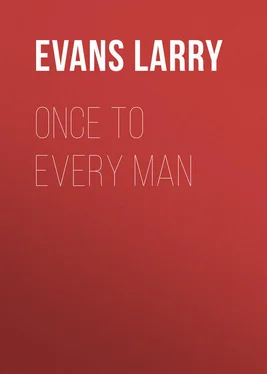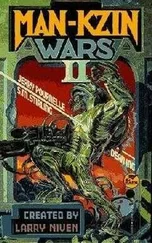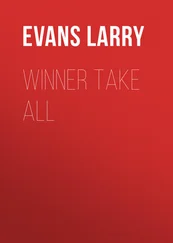Larry Evans - Once to Every Man
Здесь есть возможность читать онлайн «Larry Evans - Once to Every Man» — ознакомительный отрывок электронной книги совершенно бесплатно, а после прочтения отрывка купить полную версию. В некоторых случаях можно слушать аудио, скачать через торрент в формате fb2 и присутствует краткое содержание. Жанр: foreign_antique, foreign_prose, foreign_sf, на английском языке. Описание произведения, (предисловие) а так же отзывы посетителей доступны на портале библиотеки ЛибКат.
- Название:Once to Every Man
- Автор:
- Жанр:
- Год:неизвестен
- ISBN:нет данных
- Рейтинг книги:5 / 5. Голосов: 1
-
Избранное:Добавить в избранное
- Отзывы:
-
Ваша оценка:
- 100
- 1
- 2
- 3
- 4
- 5
Once to Every Man: краткое содержание, описание и аннотация
Предлагаем к чтению аннотацию, описание, краткое содержание или предисловие (зависит от того, что написал сам автор книги «Once to Every Man»). Если вы не нашли необходимую информацию о книге — напишите в комментариях, мы постараемся отыскать её.
Once to Every Man — читать онлайн ознакомительный отрывок
Ниже представлен текст книги, разбитый по страницам. Система сохранения места последней прочитанной страницы, позволяет с удобством читать онлайн бесплатно книгу «Once to Every Man», без необходимости каждый раз заново искать на чём Вы остановились. Поставьте закладку, и сможете в любой момент перейти на страницу, на которой закончили чтение.
Интервал:
Закладка:
Out in the larger front room, as she hovered over the work spread out before her, the girl, too, was talking aloud to herself, not in the toneless, rambling voice that came from John Anderson’s mumbling lips, but in hushed, rapt, broken sentences which were softly tinged with incredulous wonder.
The yellow glow of the single lamp, pushed far across the table from her, where the most of its radiance was swallowed up by the gloom of the uncurtained window, flickered unsteadily across her shining, tumbled hair, coloring the faintly blue, thinly penciled lines beneath her tip-tilted eyes with a hint of weariness totally at variance with the firm little sloping shoulders and full lips, pursed in a childish pout over a mouthful of pins.
The hours had passed swiftly that day for Dryad Anderson; and the last one of all–the one since she had lighted the single small lamp in the room and set it in the window, so far across the table from her that she had to strain more and more closely over her swift flashing scissors in the thickening dusk–had flown on winged feet, even faster than she knew.
Twice, early in the evening she had laid the long shears aside and risen from the matter that engrossed her almost to the exclusion of every other thought, to peer intently out of the window across the valley at the bleak old farmhouse on the crest of the opposite ridge; and each time as she settled herself once more in the chair, hunched boyishly over the table edge, she only nodded her bright head in utter, undisturbed unconsciousness of the passage of time.
“He’s late getting home tonight,” she told herself aloud, after she had searched the outer darkness in vain for any answering signal, but there was not even the faintest trace of troubled worry in her words. She merely smiled with mock severity.
“He’s later than he ought to be–even if it is his last week back in the hills. Next week I’ll have to make him wait–”
Her vaguely murmured threat drifted away into nothingness, left unfinished as she rose and stood, hands lightly bracketed upon her hips, scrutinizing the completed work.
“There,” she went on softly, sighing in deep relief, “there–that’s done–if–if it will only fit.”
She removed the cluster of pins from her mouth and unfastened the long strip of newspaper from the section of the old black skirt which she had ripped apart that afternoon for a pattern. It was far too short–that old skirt–to duplicate the long free lines of the brilliant red and black costume of the dancer beside her elbow on the table, but Dryad Anderson’s shears, coasting rapidly around the edge of the worn cloth, had left a wide margin of safety at the hem.
The critical frown upon her forehead smoothed little by little while she lifted cautiously that long strip of paper pattern and turned with it dangling from one hip to walk up and down before the tilted mirror at the far end of the room, viewing her reflected image from every possible angle. Even the thoughtful pucker at the corners of her eyes disappeared and she nodded her small head with its loosened mass of hair in judicious satisfaction.
“I do believe that’s it,” the hushed voice mused on, “or, if it isn’t, it is as near as I can ever hope to get it. If–if only it doesn’t sag at the heels–and if it does I’ll have to–”
Again with a last approving glance flung over one shoulder the murmured comment, whatever it might have been, was finished wordlessly. Her fingers, in spite of their very smallness as strong and straight and clean-jointed as those of the old man bent double over his bench in the back room, lingered absently over the folding of that last paper pattern, and when she finally added it to the top of the stack already folded and piled beside the lamp her eyes had become velvety blank with preoccupation.
From early afternoon, ever since the Judge himself had whirled up to the sagging gate at the end of their rotting boardwalk and clambered out of his yellow-wheeled buckboard to knock with measured solemnity at the front door, Dryad had been rushing madly from task to task and pausing always in just such fashion in the midst of each to stand dreamily immobile, everything else forgotten for the moment in an effort to visualize it–to understand that it was real, after all, and not just a cobweb fabric of her own fancy, like the dreams she was always weaving to make the long week days pass more quickly.
It was more than a few years since the last time Judge Maynard had driven up to the gate of that old, drab cottage; and now standing there with one slim outstretched hand lovingly patting the bundle of paper patterns which represented her afternoon’s work, she smiled with gentle derision for the mental picture she had carried all those years of the wealthiest man in Boltonwood.
The paternal, almost bewildering familiar cordiality with which he had greeted her and the pompously jovial urgency of the invitation which he had come to deliver in person, urging acceptance upon her because she “saw entirely too little of the young folks of the town,” was hardly in accord with the childish recollection she had carried with her, year after year, of a purple faced, cursing figure who leaned over the rickety old fence that bounded the garden, shook his fists in John Anderson’s mildly puzzled face and roared threats until he had to cease from very breathlessness.
A far different Judge had bowed low before her that afternoon when she answered the measured summons at the door–a sleek, twinkling, unctuously solicitous, far more portly Judge Maynard–and Dryad Anderson, who could not know that he had finally come to agree with the rest of the village that he might “catch more flies with molasses than with vinegar,” and was ordering his campaign accordingly, flushed in painful memory for the half-clad, half-starved little creature that had clung to John Anderson’s rusty coat-tails that other day and glared black, bitter hate back at the man beyond the fence.
Leaning against the table there in the half light of the room, a slow smile curled back the corners of her lips, still childishly quizzical in contrast with that slim roundness of body which was losing its boyish litheness in a new slender fullness that throbbed on the threshold of womanhood. She smiled deprecatingly as she lifted one hand to search in the breast of the blouse that was always just enough outgrown to fail of closing across her throat, and drew out the thing which the Judge had delivered with every possible flourish, barely a few hours back.
Already the envelope was creased and worn with much handling, but the square card within, thickly, creamily white, was still unspotted. As if it were a perishably precious thing her fingers drew it with infinite care from its covering, and she leaned far across the table to prop it up before her where the light fell brightest. Pointed chin cupped in her palms, she lay devouring with hungry eyes the words upon its polished surface.
“– requests the pleasure of,” she picked up the lines which she already knew by rote; and then, “Miss Dryad Anderson’s company,” in the heavy sprawling scrawl which she knew must have come from the Judge’s own pen.
Suddenly her two hands flashed out and swept the card up to crush it against her with passionate impetuosity.
“Oh, you wonderful thing!” she crooned over it, a low laugh that was half a sob bubbling in her throat. “You wonderful thing! And to think that I’ve had you all the afternoon–almost all day–and he’s had to wait all this time for his to come. He’s had to wait for Jerry to bring his with the mail–and Jerry is so dreadfully slow at times.”
Lingeringly, as though she hated to hide it, her fingers thrust the card back inside its envelope. And she was tucking it away in its warm hiding place within the scant fullness of the white blouse when the clock on the wall behind her began to beat out the hour with a noisy whir of loosened cogs.
Читать дальшеИнтервал:
Закладка:
Похожие книги на «Once to Every Man»
Представляем Вашему вниманию похожие книги на «Once to Every Man» списком для выбора. Мы отобрали схожую по названию и смыслу литературу в надежде предоставить читателям больше вариантов отыскать новые, интересные, ещё непрочитанные произведения.
Обсуждение, отзывы о книге «Once to Every Man» и просто собственные мнения читателей. Оставьте ваши комментарии, напишите, что Вы думаете о произведении, его смысле или главных героях. Укажите что конкретно понравилось, а что нет, и почему Вы так считаете.












